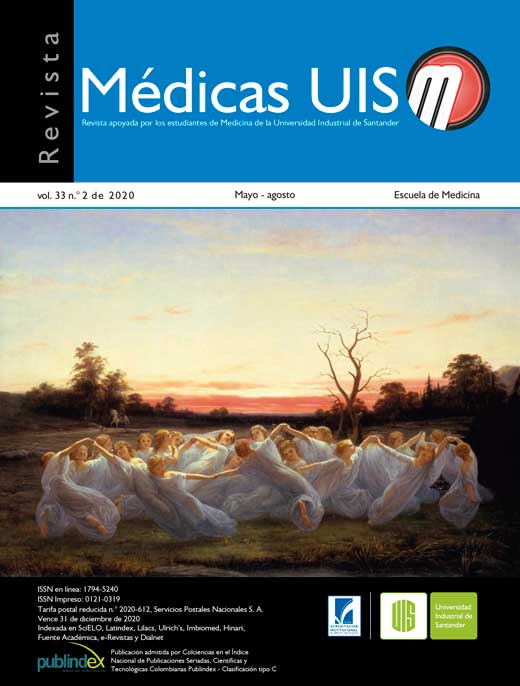Abstract
Introduction: A third of medical errors has been related to medication errors. In the pediatric population, an incidence of medication errors 3 times higher compared to adults has been described. A recommended strategy to improve medication errors risk management describes the adoption of a notification system that allows detection, identification of causes and the implementation of activities focused on prevention. Objective: To determine the prevalence and o characterize medication errors in the pediatric service reported in the clinical risk management and notification system of an academic hospital in 2017 and 2018. Methodology: Cross-sectional study. The proportion of medication errors in the pediatric department was quantified from a report of the Clinical Risk notification System for 2017 and 2018. Medication errors were grouped according to process, type of error, subgroup and gravity. Descriptive statistics were used for The error rate was 7,71 per-1000 patient days. Most of the errors were classified as Error without damage (category B and C), 176 both subcategories (total 352), representing 93,62 % of the total of errors. The prescription process was the one that most reported errors 59,84%. Conclusions: Most of the reported medication errors were related to the prescription. The main were classified in the errors without damage category. MÉD.UIS.2020;33(2):33-40.
References
Makary MA, Daniel M. Medical error-the third leading cause of death in the US. BMJ (Online). 2016;353:i2139.
Gutiérrez S, Mogni A, Berón A, Iramain R. Errores de medicación en niños hospitalizados. Arch Pediatría Urug. 2011;82(3):133-40.
Miller M, Robinson K, Lubomski L, Rinke M, Pronovost P. Medication errors in paediatric care: a systematic review of epidemiology and an evaluation of evidence upporting reduction strategy recommendations. Qual Saf Health Care. 2007;16(2):116- 26.
Bates DW, Cullen DJ, Laird N, Petersen LA, Small SD, Servi D, et al. Incidence of adverse drug events and potential adverse drug events. Implications for prevention. ADE Prevention Study Group. JAMA. 1995;274(1):29-34.
Sánchez-Muñoz LA, Mayor-Toranzo E, Rodríguez-Martín C. Análisis modal de fallos y efectos del sistema de utilización de medicamentos. Farm Hosp. 2012;36(4):299-300.
Otero López MJ. Nuevas iniciativas para mejorar la seguridad e la utilización de los medicamentos en los hospitales. Rev Esp Salud Pública. 2004;78(3):323-39.
Otero López MJ, Castaño Rodríguez B, Pérez Encinas M, Codina Jané C, TamésAlonso MJ, Sánchez Muñoz T. Actualización dela clasificación de errores de medicación del grupo Ruiz-Jarabo 2000. Farm Hosp. 2008;32(1):38-52.
World Health Organization. WHO launches global effort to halve medication-related errors in 5 years [Internet]. 2017 [citado 28 abril 2019]. Disponible en: https://www.who.int/newsroom/ etail/29-03-2017-who-launches-global-effort-to-halvemedication- related-errors-in-5-years
Pastó-Cardona L, Masuet-Aumatell C, Bara-Oliván B, Castro- Cels I, Clopés-Estela A, Pàez-Vives F, et al. Estudio de incidencia de los errores de medicación en los procesos de utilización del medicamento: prescripción, transcripción, validación, preparación, dispensación y administración en el ámbito hospitalario. Farm Hosp. 009;33(5):257-68.
Cortázar Y. Análisis de los reportes de errores de medicación de un programa de seguridad de paciente en un hospital de alta complejidad de la ciudad de Bogotá [tesis e maestría]. Universidad Nacional de Colombia; 2018. Recuperado de https://repositorio.unal.edu.co/bitstream/handle/unal/69212/ tesisyira%20ver%20final.pdf? equence=1&isAllowed=y
Organización Mundial de la Salud. Sistemas de notificación y aprendizaje sobre errores de medicación: el papel de los centros de farmacovigilancia[Internet]. . Ginebra: Organización Mundial de la Salud; 2018. Disponible en: https://apps.who.int/iris/ itstream/handle/10665/276898/9789243507941-spa.pdf?ua=1 emergency research network: Sharing to improve patient safety. Emergency Medicine Journal. 2013; 30 (10): 815–9.
Otero, P., Leyton, A., Mariani, G. & Cernadas, J. M. C. Medication errors in pediatric inpatients: Prevalence and results of a prevention program. Pediatrics. 2008; 122(3): 737-43.
Assunção Costa L, Valli C, Pimentel Alvarenga A. Erros de dispensação de medicamentos em um hospital público pediátrico. Rev Latino-am. Enfermagem. 2008;16(5).
Honey BL, Bray WM, Gomez MR, Condren M. Frequency of prescribing errors by medical residents in various training programs. J Patient Saf. 2015;11(2):100-4.
Gates, P. J. et al. Prevalence of Medication Errors Among Paediatric Inpatients: Systematic Review and Meta-Analysis. Drug Safety. 2019; 42 (11) 1329–1342.
Ocaña V, Sánchez Domenech G, Sánchez C. Errores en el proceso de medicación de pacientes internados en el Hospital Público Materno Infantil de Salta. Rev Argent Salud Pública. 2017; 8(31): 19-26.
Guerrero-Aznar MD, Jiménez-Mesa E, Cotrina-Luque J, Villalba-Moreno A, Cumplido-Corbacho R, Fernández- Fernández L. Validation of a methodfornotifying and
monitoringmedicationerrors in pediatrics. AnPediatr (Barc). 2014; 81:360–367.
Kaushal R. Medication Errors and Adverse Drug Events in Pediatric Inpatients. JAMA. 2001;285(16):2114.
Hoyle JD, Davis AT, Putman KK, Trytko JA, Fales WD. Medication dosing errors in pediatric patients treated by emergency medical services. Prehospital Emerg Care Off J Natl Assoc EMS Physicians Natl Assoc State EMS Dir. 2012;16(1):59-66.
Chua SS, Chua HM, Omar A. Drug administration errors in paediatric wards: a direct observation approach. Eur J Pediatr. 2010;169(5):603-11.
Farley DO, Haviland A, Champagne S, Jain AK, Battles JB, Munier WB, et al. Adverse-event-reporting practices by US hospitals: results of a national survey. Qual Saf Health Care. 2008;17(6):416- 23.
Ross LM, Wallace J, Paton JY. Medication errors in a paediatric teaching hospital in the UK: five years operational experience. Arch Dis Child. 2000;83(6):492-7.
Chi Man C. Public Opinions Help Those Who Help Themselves: ¿Do Doctors Deserve the Right to Dispense? [Internet]. The Hong Kong Medical Association; 2006 [citado 25 de julio de 2019]. Disponible en: http://www.hkma.org/english/cme/onlinecme/ cme200610set.htm

This work is licensed under a Creative Commons Attribution 4.0 International License.
Copyright (c) 2020 Médicas UIS
